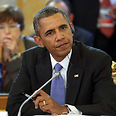
Poll: Americans' distaste for military strike on Syria is growing
Reuters/Ipsos, AP polls find more and more US citizens oppose American intervention in Syria. Obama plans to give nationally televised speech to Americans on Tuesday night
The poll, conducted on September 5 to 9, indicated that 63% of Americans opposed intervening in Syria, up from 53% in a survey that ended August 30. That was a week after the August 21 chemical attack in a Damascus suburb that US officials say killed more than 1,400 adults and children.
Related stories:
- Seven in 10 Americans believe strike won't achieve US goals
- Obama tells nation that Syria is 'not another Iraq or Afghanistan'
- Kerry to Lavrov: US not 'playing games'
Meanwhile, support for a US intervention in Syria has declined, the poll found. About 16% of Americans surveyed said the United States should get involved – down from 20% on August 30.
And even if it's proven that Syrian President Bashar Assad's troops used chemical weapons against fellow Syrians, only 26% of Americans said the United States should intervene.
About 52% said the US military should not get involved in such a circumstance, up from 44% on August 30.
The poll's findings represent the latest evidence of Americans' reluctance to get involved in another military action after more than a decade of war in Iraq and Afghanistan.
Ipsos pollster Julia Clark said the poll suggests that "the American public has very little appetite for intervention of any kind, anywhere."
The poll's release came as the Obama administration continued to press its case for military action in Syria – and as a potential diplomatic solution appeared to emerge in a crisis that has vexed the White House.
The US president planned to sit for six network television interviews on Monday as he stepped up an intense – but decidedly uphill – fight for a skeptical Congress' authorization of military force. Obama also planned to give a nationally televised speech to Americans on Tuesday night.
Meanwhile, an offer from Russia to help put Syria's stock of chemical weapons under international control raised the prospect of an agreement that could help Obama avoid an unpopular military action – and perhaps save him from an embarrassing rejection by Congress.
Even if Obama were to give a very well-received speech on Tuesday about the need for military action, Clark said, "there is never going to be a majority shift for intervention. ... The margin (opposing involvement in Syria) is just too large."
She added that as Americans learn more about the ongoing conflict in Syria and Assad's alleged use of chemical weapons, "they become increasingly opposed" to US intervention.
Clark said Americans' taste for intervention in Syria also likely has been dampened by the ongoing political debate in Washington sparked by Obama's call for congressional authorization and the generally negative view Americans have of politicians.
AP poll: Most Americans oppose strike on Syria
According to an AP poll, only 1 in 5 Americans believe that failing to respond to chemical weapons attacks in Syria would embolden other rogue governments, rejecting the heart of a weeks-long White House campaign for US military strikes.
The poll of 1,007 adults nationwide found that most Americans oppose even a limited attack on Syria – likely with cruise missiles – despite Obama administration warnings that inaction would risk national security and ignore a gruesome humanitarian crisis. A slim majority – 53% – fear that a strike would lead to a long-term US military commitment in Syria.
The survey reflects a US public that is tired of Mideast wars after a dozen years of military action in Iraq and Afghanistan. It undercuts political support President Barack Obama is hoping to garner as he seeks congressional authorization this week to strike the regime of Syrian President Bashar Assad.
"We need to stop being so aggressive militarily," Izzy Briggs, a business services consultant, said Monday. "I think these small countries are feeling very intimidated by the US and some feel they have to have these sorts of weapons."
"We must balance the legitimate concerns that Americans have about the use of military force with our strategic interests," said Sen. Heidi Heitkamp, a Democrat who on Monday announced she would not support the White House plan.
US opposition to striking Syria cuts across party lines, as does doubt that an American attack would deter other world leaders from using chemical weapons.
The poll indicated that 53% of Democrats, 59% of independents and 73% of Republicans believe Congress should vote against the plan to strike Syria. Only one out of four Democrats think that an attack would deter other world leaders from acquiring and using chemical weapons; even fewer Republicans and independents agreed.
"It's not good what they're doing to their own people, but we don't want to start World War III," said Rosie Vega, a retired receptionist who was at a California bakery on Monday morning.
Just 16% of Americans said they did not think that the limited strikes would lead to a longer military campaign, the poll indicated. And an overwhelming majority – 75% – said they do not support sending US troops to Syria. Obama has already pledged that will not happen.
The AP poll found that 54% of people do not approve the way Obama has handled the US response to Syria. That marked an increase from the 43% in June 2012.
- Receive Ynetnews updates directly to your desktop










